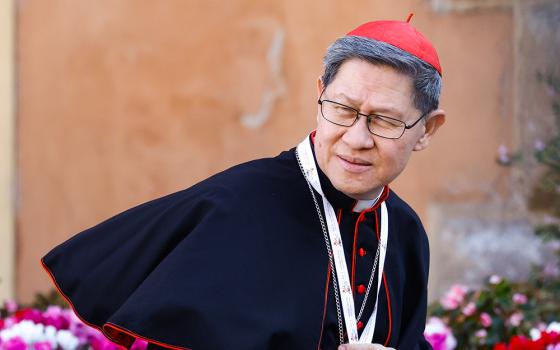Pope Francis is no naïve Pollyanna when he speaks of the importance of joy in spreading the Gospel in his first apostolic exhortation.
In Evangelii Gaudium, he warns us against being "disillusioned pessimists, 'sourpusses.' " But he also acknowledges the real and constant challenges of pastoral work: "Along this journey of evangelization we will have our moments of aridity, darkness and even fatigue."
I work on an international leadership team for Marianist Lay Communities. We are five people from four different continents speaking three different languages. Our team has a spiritual adviser, a Marianist brother who lives and works with the poor in Brazil. When we are overwhelmed with the tasks and stresses before us and tensions are rising, Brother Domingo reminds us to be joyful leaders. How can we inspire others, he says, without radiating joy ourselves?
Be joyful. The message is deceptively simple and tempting to toss aside for its simplicity. Yet it is perhaps the wisest leadership advice I've ever received. It is also often the hardest to follow.
Joy is easily forgotten in pastoral work when all our energies are expended on agendas, mission statements, vision documents, strategic plans and financial goals. We measure our worth with how busy we are then communicate that busyness to those we serve via newsletters, websites, Twitter accounts and Facebook pages. It's easy to pop a smile for a photo. It's a lot harder to maintain that good humor when we are burdened with the worries of our work.
In Evangelii Gaudium, Pope Francis describes "pastoral acedia" as a tiredness that is "tense, burdensome, dissatisfying and, in the end, unbearable fatigue." The problem, he says, is not an excess of activity, "but rather activity undertaken badly, without adequate motivation, without a spirituality which would permeate it and make it pleasurable." Some of the causes Francis lists include unrealistic expectations or projects, impatience, and a need to control the natural rhythm of life. He believes our present-day obsession with immediate results makes it "hard for pastoral workers to tolerate anything that smacks of disagreement, possible failure, criticism, the cross."
It's unrealistic to be in a constant state of joy and cheerfulness. My husband and I were introduced to the concept of the "Romance, Disillusionment, True Joy" cycle during our Engaged Encounter retreat. We've lived the reality of the cycle many times in our 32 years of marriage. I've experienced the same cycle in my faith life and various pastoral ministries. The high energy of the romance stage with all its glorious visions of the future eventually gives way to times of disillusion, anger, disappointment and fatigue. The dark night of the soul is a wretched time, but it can also be a time of soul searching and re-grounding. It's a time to look beyond the chaff and focus on the wheat, to rediscover the "who" and the "why" of our work. Has it lost its Christ-centeredness? If we persevere, we can emerge from the dark times with a deeper faith and more realistic outlook on what we are capable of doing. True joy is joy that has been tried and tested. And then the cycle begins anew.
Pope Francis and Brother Domingo have a lot in common. Both have been immersed in ministry with and for the poor in Latin America and are no strangers to the real-life struggles of humanity. They do not live with their heads in utopian clouds or sheltered in ecclesial ivory towers. They are men of faith-filled prayer and justice-filled action. When they speak of joy, it is not a superficial emotion but a vital tool in their evangelizing efforts.
In Evangelii Gaudium, Francis' words ring out with an inspiring practicality: "Challenges exist to be overcome! Let us be realists, but without losing our joy, our boldness and our hope-filled commitment. Let us not allow ourselves to be robbed of missionary vigour!"






